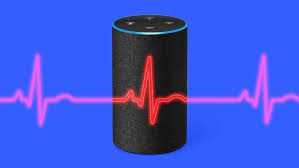Given how we’re increasingly engaged in the digital world using our smart phones, joining Zoom meetings, exchanging voice messages and interacting with home assistants like Alexa, a huge number of sound files are being created. These sound files are digital and contain structured data. This is a great resource for AI algorithms to mine for health clues. Indeed, we’re seeing that AI can analyze all kinds of helpful data to diagnose and track disease. This means that as smart speakers become more ubiquitous and as smartphones expand their use cases, they can be used to improve patients’ health.
At the moment, smart speakers are known for playing our favorite music, telling us the weather or reminding us when to get up and take a walk. However, they could also be an important tool for patient management. Researchers from the University of Washington have pioneered a system that allows smart speakers to monitor heartbeats using sonar. Machine learning (ML) makes this technology possible. They were even able to detect irregular heart rhythms, which is more challenging than just detecting normal rhythms since those have a regular pattern. The speaker works by emitting a high frequency sound that’s inaudible to the human ear and which gets reflected back by the user’s chest to be picked up by the microphone array. The researchers then developed a self-supervised learning algorithm to process the signal and to pick up the tiny vibrations in the skin that are caused by the heartbeat. It can even do this against a backdrop of other sounds.
It’s able to do this because of the technologies that smart speakers use to pick out a person’s voice even when a TV is on or there are multiple different people in the room. The algorithm learns the spatial locations of their heartbeat while simultaneously learning to minimize interferences like environmental noise and respiration. It can then focus specifically on the heartbeat to calculate the intervals between beats.
This is hardly the first time that smart speakers have received attention from the healthcare industry. For example, an insurer called Anthem launched an enhanced version of its Alexa skill that’s available in 13 different commercial insurance markets. The skill is designed to allow customers to contact an Anthem customer service employee or to order refills on their prescriptions, and it’s available to anyone with an Alexa compatible device or the Alexa mobile app.






